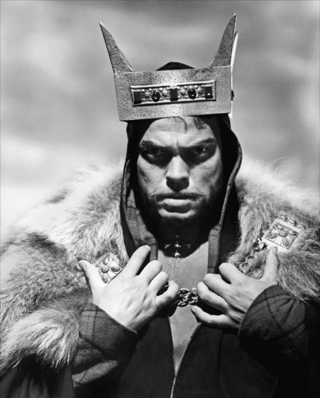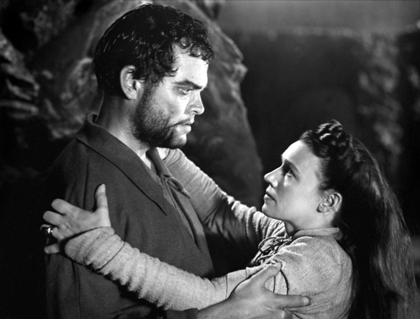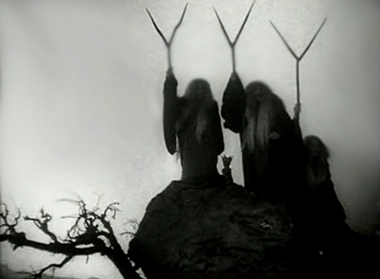
 |
|
|
|
Just a handful of years after his triumphant, controversial Citizen Kane the great Orson Welles had pretty much been written off by the Hollywood establishment. Of his four officially signed feature films, two were editorially savaged by his studio employers. He was branded an uncontrollable maker of unreleasable movies, despite the fact that his The Stranger was a wholly conventional espionage thriller that didn't overrun its budget and made money. Before abandoning Hollywood Welles put together one last bid for a breakout success. Herbert Yates of Republic Pictures' made modest westerns but was also a Welles fan. He okayed a short shooting schedule for the production of a Welles- written and directed version of Shakespeare's Macbeth. He rehearsed his actors on stage at the Utah Centennial Festival. Herbert Yates' $200,000 did not leave much money for salaries. The original Lady Macbeth, Agnes Moorehead dropped out of the cast before filming began and was replaced by the new-to-the-screen Jeanette Nolan. 
The Bard had never failed the 'boy genius' in the past. Filming entirely on Republic's sound stages, Orson Welles made sure to give his Macbeth a distinctive look, which has been likened to that of a horror movie. Duncan's castle is a rain-soaked, fogbound collection of caves and rooms carved out of stone, a gloomy opera set devoid of decorative touches. Actor Dan O'Herlihy (Buñuel's Robinson Crusoe, RoboCop), reportedly collaborated with Welles on the set designs. For his music Welles hired European Jacques Ibert, perhaps remembering the composer's score for the Feodor Chaliapin version of Don Quixote. Welles also found a capable Director of Photography in John L. Russell, who did fine work in the genre trenches before attracting the attention of Alfred Hitchcock for the superb Psycho. Dan O'Herlily's Macduff and Jeanette Nolan's Lady Macbeth are the acting standouts, but Welles' carefully chosen cast includes Roddy MacDowall, John Dierkes, Lurene Tuttle and, as one of Macduff's unlucky children, Welles' own daughter Christopher. Kane reporter William Alland is also notable as a hired murderer. By all accounts the 1948 previews were disastrous, and the film saw only limited distribution in that year. Resistance to the director's outspoken political opinions as well as sniping by industry detractors surely had an effect on the film's critical reception, which resembled the Hollywood equivalent of a lynch mob. The Hollywood Reporter trashed the film in its trade review, complaining that a 'strutting' Welles dominated scenes usually viewed as belonging to other characters. Life's photo layout gleefully assaulted the movie, with a caption that read, "Orson Welles Doth Foully Slaughter Shakespeare." Variety's trade review was kinder, but even it felt that Welles 'hogs the spotlight.' The New Yorker's reviewer dismissed the show with a series of snide observations, while Newsweek's critical assessment was more reasoned. Its reviewer called the show a misfire, complaining that Welles' Macbeth has no depth -- he's just as cold and malign at the beginning as he is at the finish. Without Shakespeare's full arc the character is not corrupted and therefore no tragedy is created. 
Reviewers took easy potshots at Welles' (purposely) stylized crowns while other critics were suddenly transformed into Shakespeare experts. Many compared Welles' film unfavorably to Laurence Olivier's Hamlet released the same year to great acclaim. Both men adapted and condensed their plays, and added their own experimental touches. Welles cut and rearranged speeches, created a new character (A Holy Father, played by Alan Napier) and eliminated others. But the biggest problem came from Welles' decision to have his actors read their parts with Scots accents. Faced with complaints that the dialogue was indecipherable, co-producer Richard Wilson countered with the remark that the average viewer --and most critics -- can't follow Shakespeare's language without a written guide anyway. But the accents made for a handy critical target: one reviewer ridiculed the moment when Lady Macbeth said, "Ooot, ooot damned spot!" Macbeth went the sorry way of most Orson Welles movies: on July 15, 1949 the trade papers reported that Republic was withdrawing the film for redubbing. The entire cast was called back to re-read their lines accent-free. Welles was said to be 'bitterly disappointed', probably because he perceived that this public thrashing would mean the end of his Hollywood career. Cut by 21 minutes and revoiced, a replacement version of Macbeth supplanted the original for a full thirty years. Artistic vindication for Orson Welles did not come until 1980, when archivist Bob Gitt came across incomplete original materials for the Welles version among Republic holdings donated for safekeeping to the UCLA Film Archive. These were augmented with dupes obtained from the original British distributor; the entire original soundtrack (with Scottish burrs intact) came from the Brit materials as well. The re-premiere of Welles' version became a major cinema event, with critic Todd McCarthy detailing the restoration in Variety. This was before the practice of film preservation and restoration was widely known. 
As might be expected, when finally heard again the reportedly impenetrable Scots accents are no more problematic than that of any Shakespeare adaptation. While lauding the restoration critic Stanley Kauffmann still saw flaws in the performances, echoing some of the original criticism that actor Welles placed himself front and center far too consistently. Newer critics found much more of interest in Welles' direction than did older performance-oriented reviews. Not only does the director's stylization impart a sense of epic scope and gothic mood to the tale, expressive camera blocking and claustrophobic close-ups keep the drama front and center. The show dramatizes most of the play's action without rushing from one set piece to the next. Orson Welles' take on the Thane of Cawdor may not be the best of all possible versions of Macbeth but it is certainly one of the most interesting. Olive Films' Blu-ray of Macbeth is a careful encoding of the full-length, restored original Orson Welles cut. The materials exhibit a number of flaws here and there, including what looks like very light mottling (water damage) on one side of the frame in a couple of reels. But the overall appearance of the show is very good, and certainly far better than older TV prints of the short version, which were both soft and dark. The HD image pulls out a great deal of previously unseen detail in makeup, costumes and the massive sets of rocky caves and battlements, complete with painted backdrops. A subtitle track would have been a welcome extra. As with most Shakespeare adaptations a familiarity with the famous texts will be a great aid to the viewer, although most of us have at least heard the more famous passages: the Three Witches at their cauldron; Macbeth's "Tomorrow and Tomorrow" speech; the fiery words traded with Macduff before the final set-to with broadswords. These moments are generally more cinematically effective than those in other, more literal interpretations of the play.
On a scale of Excellent, Good, Fair, and Poor,
Macbeth Blu-ray rates:
Reviews on the Savant main site have additional credits information and are often updated and annotated with reader input and graphics. Also, don't forget the 2011 Savant Wish List. T'was Ever Thus.
Review Staff | About DVD Talk | Newsletter Subscribe | Join DVD Talk Forum |
| ||||||||||||||||||